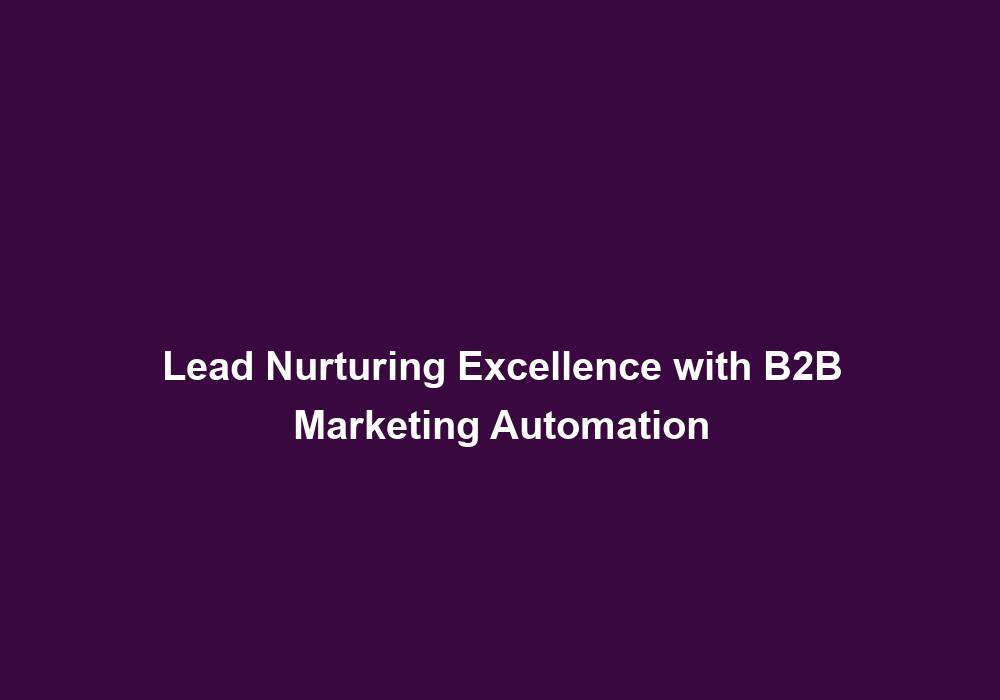In today’s fast-paced digital world, businesses are constantly looking for effective ways to nurture and convert leads into loyal customers. One powerful tool that has gained significant popularity in recent years is B2B marketing automation. By leveraging the capabilities of marketing automation platforms, businesses can streamline their lead nurturing efforts, enhance efficiency, and ultimately drive higher conversion rates.
Understanding Lead Nurturing
Before delving into the benefits of B2B marketing automation, it is essential to understand the concept of lead nurturing. Lead nurturing refers to the process of building relationships with potential customers at various stages of the sales funnel. It involves consistently providing relevant and valuable information to prospects to guide them towards making a purchase decision.
Lead nurturing is crucial because it allows businesses to establish trust and credibility with their prospects. By delivering personalized and targeted content, businesses can address the specific pain points and challenges that prospects face. This approach helps in building a strong relationship with prospects and positions the business as a trusted advisor in their industry.
The Role of B2B Marketing Automation
B2B marketing automation platforms serve as a comprehensive solution for managing and automating lead nurturing campaigns. These platforms offer a wide range of features and functionalities designed to optimize the lead nurturing process, enhance customer engagement, and drive revenue growth. Let’s explore some key benefits of using B2B marketing automation for lead nurturing excellence:
1. Enhanced Lead Segmentation and Targeting
B2B marketing automation allows businesses to segment their leads based on various criteria such as demographics, behavior, interests, and engagement level. By categorizing leads into different groups, businesses can deliver personalized and targeted content that resonates with the specific needs and preferences of each segment.
Segmentation enables businesses to create highly relevant and tailored messages for each group, increasing the chances of engagement and conversion. For example, a software company can segment leads based on their industry and deliver industry-specific case studies, whitepapers, or webinars that address their unique pain points.
2. Automated Lead Scoring
With B2B marketing automation, businesses can implement lead scoring systems to prioritize and focus on leads with the highest potential to convert. By assigning scores based on criteria such as engagement level, demographics, and actions taken, businesses can identify and prioritize leads that are most likely to become customers.
Lead scoring helps businesses allocate their resources effectively by focusing on leads that are more likely to generate revenue. For instance, a lead who has visited the pricing page multiple times, downloaded a product demo, and attended a webinar would receive a higher lead score compared to a lead who has only visited the website once.
3. Personalized and Timely Communication
B2B marketing automation platforms enable businesses to automate the delivery of personalized and timely communication to leads. Through automated email campaigns, businesses can deliver targeted messages based on specific triggers, such as website visits, content downloads, or event registrations.
Personalized communication helps nurture leads by providing them with the right information at the right time. For example, if a lead downloads a whitepaper on a specific topic, the marketing automation platform can automatically send a follow-up email with related resources or case studies. This approach keeps leads engaged and moves them closer to a purchase decision.
4. Streamlined Lead Nurturing Workflows
B2B marketing automation platforms provide businesses with the ability to create and automate lead nurturing workflows. These workflows outline a series of actions and communications that are triggered based on predefined conditions and rules.
By setting up these workflows, businesses can ensure a consistent and systematic approach to lead nurturing. This eliminates manual tasks and reduces the risk of human error. For example, a lead nurturing workflow can include sending a welcome email, followed by a series of educational emails, and then a sales call after a specific time period. This streamlined process ensures that leads receive the appropriate content and follow-up actions, leading to accelerated lead-to-customer conversions.
5. Measurable and Actionable Insights
Another major advantage of B2B marketing automation is the ability to track and measure the effectiveness of lead nurturing campaigns. These platforms offer robust analytics and reporting capabilities, providing businesses with valuable insights into the performance of their campaigns.
By tracking metrics such as open rates, click-through rates, and conversion rates, businesses can identify areas for improvement and optimize their lead nurturing strategies accordingly. For example, if a particular email in the nurturing campaign has a low open rate, businesses can modify the subject line or content to increase engagement. These actionable insights enable businesses to continuously improve their lead nurturing efforts and drive better results.
6. Integration with Customer Relationship Management (CRM) Systems
B2B marketing automation platforms seamlessly integrate with CRM systems, allowing businesses to have a holistic view of their leads and customers. The integration enables the synchronization of data between the marketing automation platform and CRM, ensuring that all relevant information is readily available for both marketing and sales teams.
This integration fosters better collaboration and alignment between the two teams, ultimately leading to improved lead nurturing and higher conversion rates. For example, the sales team can access a lead’s activity history, engagement score, and preferences directly from the CRM, enabling them to have more meaningful conversations and personalized interactions with prospects.
In conclusion, B2B marketing automation is a powerful tool for achieving lead nurturing excellence. By leveraging the capabilities of these platforms, businesses can enhance lead segmentation, automate lead scoring, deliver personalized communication, streamline workflows, gain actionable insights, and integrate with CRM systems. Embracing B2B marketing automation can significantly improve lead nurturing efforts, increase conversion rates, and ultimately drive business growth in today’s competitive marketplace.
